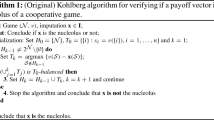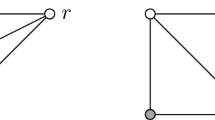Abstract
An algebraic model generalizing submodular polytopes is presented, where modular functions on partially ordered sets take over the role of vectors in R n. This model unifies various generalizations of combinatorial models in which the greedy algorithm and the Monge algorithm are successful and generalizations of the notions of core and Weber set in cooperative game theory.
As a further application, we show that an earlier model of ours as well as the algorithmic model of Queyranne, Spieksma and Tardella for the Monge algorithm can be treated within the framework of usual matroid theory (on unordered ground-sets), which permits also the efficient algorithmic solution of the intersection problem within this model.
Similar content being viewed by others
References
Bilbao, J.M. (1998) Closure spaces and restricted games, Math. Methods Oper. Res. 48, 57-61.
Birkhoff, G. (1967) Lattice Theory, 3rd edn, Amer. Math. Soc. Colloq. Publ. XXV, Providence, RI.
Burkard, R. E., Klinz, B. and Rudolf, R. (1996) Perspectives of Monge properties in optimization, Discrete Appl. Math. 70, 95-161.
Danilov, V. I., Koshevoy, G. A. and Sotskov, A. I. (1999) Equilibrium in an economy of information goods, in G. Chichilnisky (ed.), Markets, Information and Uncertainty: Essays in Economic Theory in Honor of Kenneth Arrow, Cambridge University Press, Cambridge.
Derks, J. J. M. and Gilles, R. P. (1995) Hierarchical organization structures and constraints on coalition formation, Internat. J. Game Theory 24, 147-163.
Edelman, P. H. and Jamison, R. E. (1985) The theory of convex geometries, Geom. Dedicata 19, 247-270.
Edmonds, J. (1970) Submodular functions, matroids and certain polyhedra, in R. Guy et al. (eds), Combinatorial Structures and Their Applications, Gordon and Breach, New York, pp. 69-87.
Edmonds, J. (1979) Matroid intersection, Ann. Discrete Math. 4, 39-49.
Faigle, U. (1987) Matroids in Combinatorial Optimization, in N. White (ed.), Combinatorial Geometries, Encyclopedia Math. Appl., Cambridge University Press, Cambridge, pp. 161-210.
Faigle, U. and Kern, W. (1992) The Shapley value for cooperative games under precedence constraints, Internat. J. Game Theory 21, 249-266.
Faigle, U. and Kern, W. (1996) Submodular linear programs on forests, Math. Programming 72, 195-206.
Faigle, U. and Kern, W. (2000) On the core of ordered submodular cost games, Math. Programming 87, 483-499.
Frank, A. (1999) Increasing the rooted-connectivity of a digraph by one, Math. Programming 84, 565-576.
Fujishige, S. (1991) Submodular Functions and Optimization, Ann. Discrete Math. 47, Elsevier, Amsterdam.
Hoffman, A. J. (1982) Ordered sets and linear programming, in I. Rival (ed.), Ordered Sets, Reidel, pp. 619-654.
Hoffman, A. J. (1985) On greedy algorithms that succeed, in Surveys in Combinatorics, Cambridge University Press, pp. 97-112.
Jiménez, N. (1998) Solution concepts for games over closure spaces, Ph.D. Thesis, University of Seville, Seville.
Kornblum, D. (1978) Greedy algorithms for some optimization problems on a lattice polyhedron, Ph.D. Thesis, Graduate Center of the City University of New York.
Korte, B., Lovász, L. and Schrader, R. (1991) Greedoids, Springer-Verlag, Berlin.
Krüger, U. (2000) Structural aspects of ordered polymatroids, Discrete Appl. Math. 99, 125-148.
Luenberger, D. G. (1969) Optimization by Vector Space Methodes, Wiley, New York.
Monge, G. (1781) Déblai et Remblai, Mém. de l'Academie des Sciences.
von Neumann, J. and Morgenstern, O. (1944) Theory of Games and Economic Behavior, Princeton University Press, Princeton.
Queyranne, M., Spieksma, F. and Tardella, F. (1998) A general class of greedily solvable linear programs, Math. Oper. Res., to appear.
Weber, R. J. (1988) Probabilistic values for games, in A. E. Roth (ed.), The Shapley Value, Cambridge University Press, Cambridge.
Author information
Authors and Affiliations
Rights and permissions
About this article
Cite this article
Faigle, U., Kern, W. An Order-theoretic Framework for the Greedy Algorithm with Applications to the Core and Weber Set of Cooperative Games. Order 17, 353–375 (2000). https://doi.org/10.1023/A:1006406424957
Issue Date:
DOI: https://doi.org/10.1023/A:1006406424957




